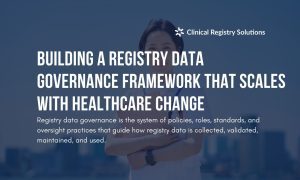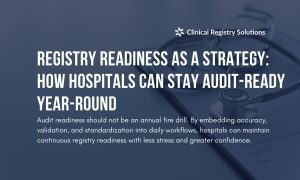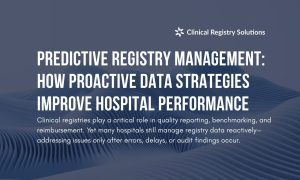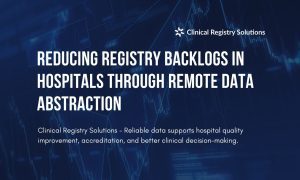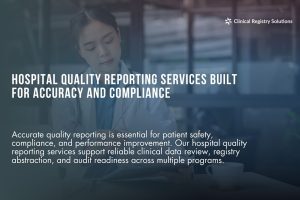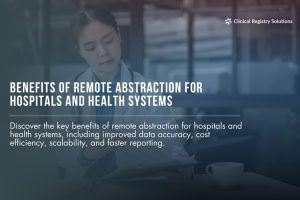The healthcare industry is increasingly relying on data to drive decisions, improve patient outcomes, and meet regulatory compliance standards. One of the key drivers behind this data-driven transformation is registry services—specialized processes that collect, analyze, and report healthcare data for a variety of purposes.
With advancements in technology, remote registry services have emerged as a powerful solution, offering healthcare organizations enhanced efficiency, scalability, and cost savings.
What Are Remote Registry Services?
Remote registry services involve outsourcing the management, data abstraction, and reporting tasks of clinical registries to specialized professionals or organizations. These tasks are performed off-site, leveraging secure technology, which allows healthcare providers to focus on patient care while ensuring their data needs are met effectively.
Clinical registries collect data related to specific diseases, conditions, or procedures. Common examples include:
- Cardiovascular registries like the ACC NCDR and STS databases
- Stroke registries such as the Get With The Guidelines (GWTG) Stroke Registry
- Cancer registries for tracking treatment outcomes and research
Remote registry services cover every aspect—from data abstraction and submission to performance benchmarking and analytics.
Key Components of Remote Registry Services
- Data Abstraction
Skilled abstractors extract relevant data from electronic health records (EHRs) and other sources, ensuring accuracy and adherence to registry requirements. - Data Validation and Quality Assurance
Rigorous checks are performed to confirm that submitted data is complete, accurate, and error-free. - Registry Submission
Data is submitted to clinical registries in a timely manner, following all formatting and deadline requirements. - Performance Benchmarking
Reports are generated to help healthcare organizations compare their outcomes against national and regional benchmarks. - Analytics and Insights
Advanced analytics provide actionable insights to improve patient care, optimize workflows, and achieve quality improvement goals.
Benefits of Remote Registry Services
- Cost Efficiency: Avoid expenses related to hiring, training, and technology investments by outsourcing registry management.
- Scalability: Easily scale data handling capabilities to meet growing organizational needs without additional internal resources.
- Access to Expertise: Work with professionals experienced in data abstraction, coding, and registry compliance.
- Time Savings: Free internal staff to focus on patient care and other priorities.
- Improved Accuracy: Specialized abstractors reduce errors and improve data quality.
- Enhanced Security: Remote providers implement robust security protocols to protect patient information and comply with HIPAA.
How Remote Registry Services Are Changing Healthcare
- Enabling Data-Driven Decision-Making
Timely, accurate data empowers healthcare leaders to make informed decisions that improve care and operational efficiency. - Facilitating Participation in Quality Programs
Remote registry services simplify compliance with programs such as CMS’s Value-Based Purchasing Program. - Supporting Research and Innovation
Registry data fuels clinical research, driving medical advancements. - Reducing Disparities in Care
Benchmarking helps identify care gaps and promotes strategies to address healthcare disparities.
Choosing the Right Remote Registry Service Provider
When selecting a remote registry provider, consider:
- Experience and Expertise: Look for providers with proven success in managing relevant clinical registries.
- Compliance and Security: Ensure the provider meets HIPAA and other regulatory standards with strong data protection.
- Technology and Tools: Advanced software for abstraction, validation, and analytics can boost efficiency and quality.
- Customization: Flexible solutions tailored to your organization’s specific needs.
- Customer Support: Reliable service for issue resolution and smooth collaboration.
Overcoming Challenges
- Data Integration: Choose providers skilled at integrating data from multiple EHR systems.
- Communication: Establish clear, consistent communication to align goals and expectations.
- Change Management: Prepare stakeholders and manage transitions carefully for a smooth shift to remote services.
Final Thoughts
Remote registry services are transforming healthcare data management by optimizing workflows, cutting costs, and improving patient outcomes. Outsourcing these critical tasks to experienced professionals allows healthcare organizations to focus on their core mission—delivering high-quality care.
As data-driven healthcare continues to expand, partnering with a trusted provider like Clinical Registry Solutions ensures your organization stays ahead, unlocking the full potential of its data for better decision-making and patient care.
